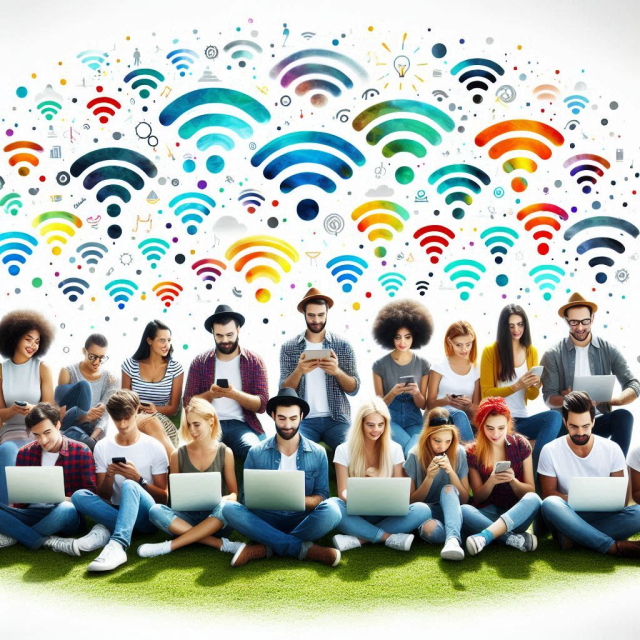The Internet, a global network of interconnected computers, has radically transformed the way we live, work and communicate. From its humble beginnings in the 1960s to its omnipresence in modern life, the internet has revolutionized virtually every aspect of society. This article explores the origin and evolution of the Internet, its impact on various spheres of life, and the challenges and opportunities it presents in the future.
Origins and Evolution of the Internet.
The First Steps: ARPANET.
The Internet has its roots in ARPANET (Advanced Research Projects Agency Network), a project developed by the United States Department of Defense in the 1960s. ARPANET was the first network to use the packet switching protocol, allowing Multiple computers share information over a common network. In 1969, ARPANET made its first connection between the University of California, Los Angeles and the Stanford Research Institute.
The Expansion of Networks.
During the 1970s, ARPANET expanded and connected more universities and research centers. In 1983, the TCP/IP (Transmission Control Protocol/Internet Protocol) protocol was introduced, which became the standard for network communication and allowed interoperability between different computer systems. This was a crucial step in the evolution of the internet as we know it today.
The Age of the World Wide Web.
In 1989, Tim Berners-Lee, a British scientist, proposed a system for managing information on the Internet called the World Wide Web (WWW). This system used hyperlinks and web browsers to facilitate access to information. In 1991, the first website was published, marking the beginning of the WWW. The popularization of web browsers in the 1990s, such as Mosaic and Netscape, made the Internet accessible to a much wider audience.
Impact of the Internet on Society.
Communication and Social Networks.
The internet has transformed communication. Social networks, emails and instant messaging applications have made it easier to connect between people around the world in real time. Platforms like Facebook, Twitter, Instagram and WhatsApp have changed the way we interact and share information, creating a global village where news and events spread instantly.
Education and Access to Knowledge.
The internet has democratized access to knowledge. Platforms like Wikipedia, Khan Academy, Coursera, and edX offer free or low-cost educational resources to people around the world. This has allowed learning to be more accessible and flexible, providing opportunities for continuing education and professional development.
Economy and Electronic Commerce.
Electronic commerce has flourished thanks to the internet. Companies like Amazon, Alibaba, and eBay have revolutionized the way we buy and sell products. In addition, the internet has allowed the creation of new forms of business and employment, such as teleworking, technological startups and freelance services. Online banking and payments have also become easier, making finances more accessible and convenient.
Entertainment and Culture.
The internet has transformed the entertainment industry. Streaming platforms like Netflix, Spotify and YouTube have changed the way we consume music, movies and television shows. Online video games and social media have also created new forms of entertainment and cultural participation. In addition, the Internet has facilitated the spread of cultures and traditions, promoting a greater understanding and appreciation of global diversity.
Health and Medicine.
The internet has had a significant impact on health and medicine. Online medical consultations, telemedicine and access to health information have improved access to healthcare and health education. Researchers can share and access medical data and studies more easily, accelerating progress in research and treatment development.
Challenges and Considerations of the Internet.
Privacy & Security.
Online privacy and security are big concerns in the digital age. The collection of personal data by companies and governments, identity theft and cyberattacks are significant problems. It is crucial that users are aware of the risks and take steps to protect their personal information, such as using strong passwords and enabling two-step authentication.
Digital Divide.
Despite progress, there is a significant digital divide between developed and developing regions. Many people in rural areas and developing countries still do not have access to the internet or have limited access. Addressing this disparity is essential to ensure that everyone can benefit from the opportunities offered by the internet.
Disinformation and Fake News.
The spread of misinformation and fake news is a growing problem on the internet. Social media and other online platforms can quickly spread misinformation, which can have serious consequences for society. It is important to encourage critical thinking and verify sources of information to combat this problem.
Addiction and Mental Health.
Excessive use of the internet and social media can lead to addiction and affect mental health. Constant exposure to social media can cause anxiety, depression, and self-esteem issues. It is essential to find a healthy balance and set limits for the use of digital devices.
The Future of the Internet.
Internet of Things (IoT).
The Internet of Things (IoT) is connecting more and more devices to the internet, from appliances to cars to security systems. This is creating a more connected and intelligent environment, with applications in homes, cities and industries. However, it also poses challenges in terms of security and privacy.
Artificial Intelligence (AI) and Machine Learning.
Artificial intelligence and machine learning are transforming the internet. AI algorithms improve content personalization, targeted advertising, and product recommendations. However, they also raise ethical concerns about bias and automated decision-making.
Global Connectivity.
The goal of achieving global connectivity remains a priority. Initiatives such as low-orbit satellites and 5G networks are working to bring high-speed internet to all parts of the world. This could bridge the digital divide and provide internet access to remote and disadvantaged communities.
The internet has been a transformative force in modern society, revolutionizing communication, education, the economy, entertainment, health and more. Despite challenges such as privacy, security and the digital divide, the opportunities it offers are vast. With a conscious and responsible approach, we can maximize the benefits of the internet while addressing its challenges, ensuring that this powerful tool remains a positive force for progress and global connection.
